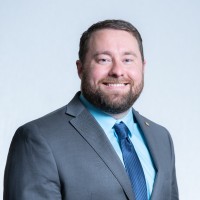As someone who keeps an eye on evolving technology, James Aden’s perspective could be summarized this way: Yesterday’s unimaginable possibility is today’s basic necessity.

“Imagine the perspective of someone alive in the 1950s. If you told them that one day, there would be a global information network that you could connect to and one of the things you could do would be talk to a computer program that would ask you questions in your chosen language and help you do your taxes, that would’ve sounded insane to them,” said Aden, a Chattanooga-based vice president with Canada’s CGI (Consultants to Government and Industry Incorporated) global computer consulting and software company.
He discussed the increasing integration of Artificial Intelligence into familiar computer and software applications on CH-AI Brews, the student-led podcast from the University of Tennessee at Chattanooga.
“When we get to the information age and the age of computing, now instead of just automating onorous physical tasks, we can start to automate mental tasks, as well. Tax preparation is a terrific example of that,” Aden said, referring to do-it-yourself tax prep software. “Then you get into machine learning and that allows a machine to look at a really broad spectrum of different data, find connections between it and articulate some sort of model for how to view it and think about it.”
Aden puts AI capabilities into five groups: generation, reduction, transformation, knowledge access and emergent behaviors.
“Generation is exactly what it sounds like. It’s what generative AI is named for, and it’s the main thing you probably think about when you think about generative AI. Generation is about creating something unique based on the synthesis of all the information that the algorithm has been fed in the past. The difference with (generation and) reduction is that you’re asking it to synthesize a smaller version of whatever you gave it,” Aden said.
“Transformation is in between those two. Imagine you gave a large language model a speech and you asked it to rewrite the speech, and it rewrites your speech so it’s essentially the same content, but it’s using different words, cadences and ways of speaking. Knowledge access is sort of a ‘subclass’ of reduction. You have some sort of knowledge base, and you give that to the generative AI model and are able to ask questions about the content you gave it,” he said.
“Emergent behaviors are things that we didn’t design or explicitly ask the AI to do, but in the course of doing what we did ask it to do, it’s doing something else or doing it in a way that we didn’t expect.”
Aden said he believes knowledge access is the most dominant capability of AI, but sought to ease worries by saying, “There’s a concept called ‘responsible AI,’ because when you have something like this, and you begin to think of it as intelligent, and you give it too much control, it can run amok.”
He also described what he calls ‘human in the loop’ versions of AI.
“That’s where you ask the generative AI to do something, and it gives you an output. You review the output and decide if this is something you were looking for,” Aden said. “There’s also ‘human on the loop’ where you have a human observing the outputs, and if the human were to step away, the process continues.
“Then you have the human completely out of the loop, and there are very few cases that are suitable for that scenario.”
Asked his perspective on the impact of AI on the types and availability of jobs, he suggested a future with jobs more likely to change than be eliminated.

“Jobs will become more competitive, but there is no class of jobs that is completely going away in the way you might have seen with past automation technologies, Aden said.”
His advice on maintaining your individual value in a technology-modified job market?
Look for a field “that is historically understaffed, where it is difficult to find enough talent to fill all the jobs that exist,” he said. “Those areas would be things like healthcare.”
He’s optimistic about the ultimate impact of AI in both the workplace and the job market.
“This technology makes people more effective at their job,” Aden said. “It’s going to increase their capabilities and allow them to do more.”
From 2009 to 2017, Aden was director of technology services with CTS, a privately held, regional IT consulting firm in Chattanooga. He joined CTI in 2017 as its director of consulting and was named a vice president in 2022. He has a bachelor’s degree in computer science from the University of Nevada-Las Vegas and a master’s degree in business administration from UTC.
The podcast CHAI Brews: Infusing Conversations About AI explores the impact of AI on university classrooms and campuses; the career fields students are pursuing and the workplaces that await them; the city of Chattanooga, the state of Tennessee and the people who live there.
Excerpts of the podcast air on Mondays on WUTC-FM 88.1 and can be found online at wutc.org. CH-AI Brews is also available on Spotify and Apple podcasts. Listen to the entire James Aden interview HERE.